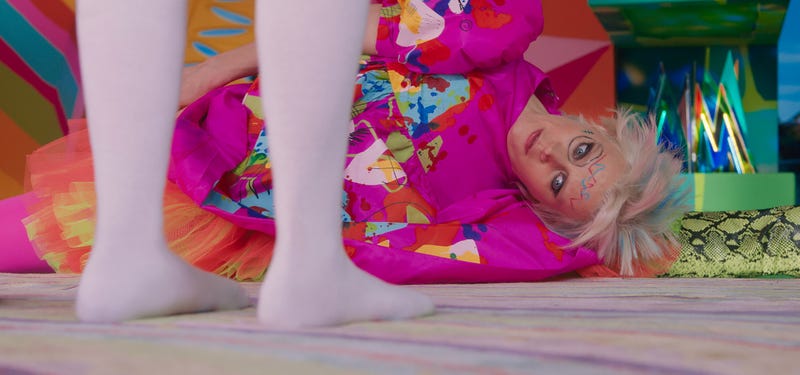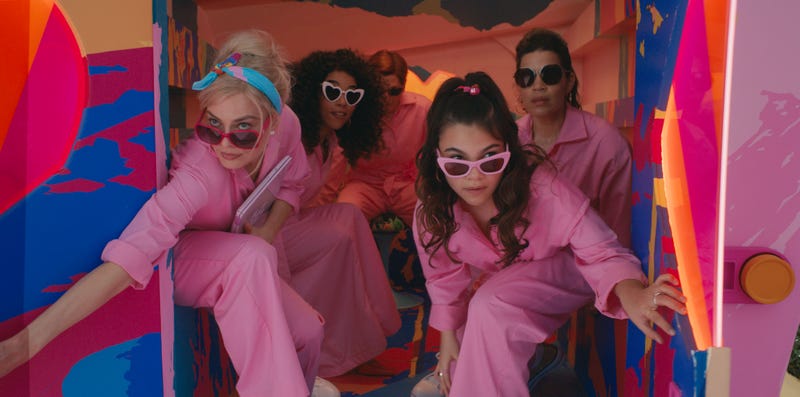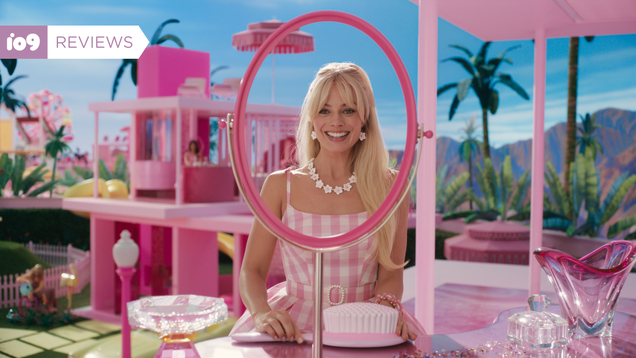In the millennial search for meaning, much has been made of the recontextualization of childhood toys. It seems we’re desperate to turn something relatively harmless into something much more meaningful than they need to be. Naturally, the ubiquitous Barbie doll has been up for debate for decades. Is she a feminist icon? Is she the hinge on which little girls went from playing house to playing out fantasies of womanhood in the 60s? Or is she just another symbol that we dress up in order to playact how to portray the ideal feminine. Who knows!
Writer/director Greta Gerwig–who wrote the script alongside her writing partner Noah Baumbach–doesn’t seem to know either. But that’s kind of the point. There’s a bit of an unanswerable mystery to Barbie, mostly because she means something different to everyone who plays with her.
Barbie takes the audience by the hand, leading us through the history of Barbie and the politics of Barbieland, where everyday is the best day ever and every Barbie is incredible, and then, quite suddenly, Barbie twists your wrist back and asks you if it hurts to be pretty and perfect and nothing else. “Do you ever think about dying?” will become the most-quoted moment of this movie. Margot Robbie as Stereotypical Barbie wakes up after imagining mortal endings and realizes something is very deeply messed up with her perfectly impossible life–flat feet are a symptom of oncoming mortal dread in a world of forever high heels, apparently–and is told by Weird Barbie (Kate McKinnon) that she has to go through a magical portal into the real world, find the human girl who is playing with her, and… make it better. Whatever “it” is. The various Barbies aren’t sure what’s going on either, really, and when Ken (Ryan Gosling) sneaks into the back of the Pink Cadillac as Barbie’s plus-one, she begrudgingly lets him come along.
Two villains emerge as Barbie attempts to figure out where her girl is in the Real World. The first is the patriarchy, embodied both by Mattel’s all-male C-suite of bigwigs (headed by Will Farrell as the CEO) and Ken himself. The second antagonistic presence, the one that becomes more existential throughout the film, is that Barbie’s lack of personality and vacuity is a huge fucking problem. Remember when I mentioned that the point of this film is that dolls mean what you make them mean? Well, Barbie expands that vibe pretty quickly once it gets to the real world, and the theme that art, stories, and ideas are likewise projections of our own cultural and societal upbringing gets fully lost in the bright sparkly hot pink sauce.
Making a movie where the main character is an empty-headed, but very earnest projection of various desires, means that Barbie as a character always seems lost. She stumbles gracelessly from problem to problem, and while Margot Robbie’s bubbly, dazzling performance is incredibly compelling, Barbie herself is always a shell of a person, not quite whole. Really her most consistent character traits are both “why won’t Ken just leave me alone” and also “girl power,” which don’t amount to much—but definitely make me think that this would have been ten times the movie it is if Barbie had come out halfway through the film.
Gerwig and Baumbach have penned a messy meditation on womanhood, beauty, and self awareness, and framed it throough essentially doing what Gerwig does best as a director, but the result isn’t a masterpiece of modern feminist cinema—the result is mostly just… Kenfusing? But it is incredibly fun to watch. Barbie is a fantastically good time. The production of Barbie Land alone, with its practical effects and real sets, is worth the price of admission. It’s deeply enjoyable, it’s fantastically presented, it’s hilarious. And honestly, that’s more than enough for most films, and it’s enough for Barbie as well. But, like a lot of millennials who are still struggling to figure out what it means to be a real person, Barbie is a little disoriented.
The two real world women—Gloria (America Ferrera) and Sasha (Ariana Greenblatt)—who have been affecting Stereotypical Barbie with thoughts of death are the real heart of this film, although they are dragged around by Barbie’s vacuity as much as the doll herself is: a mother-daughter duo who are struggling to connect not for any particular reason but just because family is hard, and finding common ground is difficult. It’s this kind of valid, mundane sorrow that echoes through Barbie, and one of the most poignant moments of the film is when Stereotypical Barbie looks at an old woman on the bus bench and tells her she’s beautiful. “I know it!” the old lady says back to Barbie, grinning. Maybe death isn’t so bad if you have a life before you get there.

There are so many moments in this film that are incredible; a massive amount of time is spent winking at the audience as Mattel and its leadership are made the butt of many jokes. It’s a derisive, if toothless, roast of the corporation that has okayed all of this, a reminder that Barbie is done with the grace of the multi-billion dollar corporation. It just slightly overstays its welcome and it’s never really changed or interrogated too deeply, but I will admit: this gag is very funny.
Ken, when he goes into the Real World, realizes that it’s run by men, not Barbies. So when he heads back to Barbie Land to teach the other Kens about patriarchy, the results are catastrophically hilarious. It’s the worst kind of vibe; frat boys on hobby horses, wearing mink and personalized leather fanny packs in Metallica-style fonts, singing Matchbox Twenty at all the Barbie girls. The end-of-second act twist is also very funny, and continues to underline the point of this film; much like dolls are played with and handled and filled up with the ideas of the people playing with them, people themselves are also roughly handled by the circumstances of their lived culture and societal experiences.
Barbie is an incredibly clever movie, but just like Stereotypical Barbie herself, struggles to elucidate on what exactly self consciousness is, and the film is a little awkward about it’s whole schtick. It’s the movie for people who hate Barbie; it’s the movie for people who love Barbie, and it seems to revel in the unfinished nature of its ideology. All of this messaging gets tied up in knots of Barbie’s own making, like a cat’s cradle that gets slipped off one finger too early— but you think that if you just keep messing with the string will come out in various perfect imitations of signs and signifiers. This is the soldier’s bed, here is the cat’s eye, here is the fish. But, like many string games, Barbie unravels.
Although the third act is a bit of a mess, it is so incredibly enjoyable, so beautifully fun and absurd to watch, that the messiness of Barbie becomes part of its fun. While this segment of the film taps into the latent cathartic feminism that so many millennials want to express on a daily basis, it is also kind of a boring list of third wave feminist “Society is Bullshit” slogans that I glazed over while listening to because ultimately, it didn’t matter. These weren’t revelations; these clichés were more like secret passwords that activated each Barbie’s latent feminism—which is a very boring way to come across societal awareness. Much like the dolls themselves, the film projects an image of feminism, but doesn’t actually say or do much about it. But boy, does this little motion picture really, really want you to think it’s pretty.

More than anything else, Barbie is a disarmingly playful, exuberant, comedic celebration of self awareness. It’s about a doll coming to life and realizing that she has wants, that she can be anything—but those ambitions are secondary to her desire to just be herself. It blurs the lines of fantasy and reality in order to make big gestures towards artistic theses about stories, ideas, open-ended questions, and art that doesn’t tie up neatly into a pink and white gingham bow.
Ultimately, Barbie is a story about displacement that echoes itself. Gerwig pushes the lines of what she can get away with, a corporate triumph that has hollow joints while still moving around just like a real girl. But much like the feminine urge to listen to the Indigo Girls while driving away from all your problems towards a totally new set of problems, Barbie never quite arrives where Gerwig wants it to go. But god, is it fun to watch.
Barbie is in cinemas now.
This piece was written during the 2023 WGA and SAG-AFTRA strikes. Without the labor of the writers and actors currently on strike, the movie being covered here wouldn’t exist.
Want more io9 news? Check out when to expect the latest Marvel, Star Wars, and Star Trek releases, what’s next for the DC Universe on film and TV, and everything you need to know about the future of Doctor Who.
